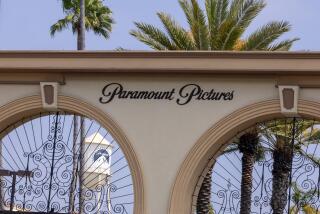NEWS ANALYSIS : Perot Decision Was a Businesslike One : Executives: ‘The deal didn’t look good, so he backed out,’ summed up a veteran Hollywood manager.
To those who know Ross Perot as a businessman who hates to waste money, his announcement Thursday that he would not run for President didn’t come as a shock.
Though the billionaire from Texarkana, Tex., once proclaimed that he would spend up to $100 million of his own money to win the Oval Office, recent polls suggested that his investment wouldn’t yield the hoped-for return.
“There’s that old country and Western song,” says Hayes McClerkin, a friend from Perot’s hometown. “ ‘You’ve got to know when to hold ‘em and know when to fold ‘em.’ Well, he knew when to fold ‘em.”
As one veteran Hollywood executive observed, “He’s a businessman, the deal didn’t look good, so he backed out.”
Many executives who have worked with Perot over the years concluded that he is temperamentally unsuited for the messy world of politics. “He likes to control his own destiny, and that’s hard to do in politics,” said Steve McElroy, a business partner of Perot’s in Austin.
Perot takes pride in his hands-on, action-oriented entrepreneurial style, which is a far cry from the measured, judicious approach that characterizes most corporate chieftains. Thus his action Thursday is in line with his charge-ahead, let’s-cut-our-losses approach that critics denigrate as impetuous but supporters laud as decisive.
Perot finds the concept of managing a bore. He says inventories are to be managed, people are to be led. His leadership, however, is often that of a one-man band for whom compromise is difficult.
In the view of Warren Bennis, USC professor of business management and head of its leadership institute, Perot “has no idea how to build coalitions that take into consideration the views of many different stake holders.”
Indeed, an examination of his past business dealings discloses a series of narrowly focused squabbles that suggest that his intensity and prickliness can make him difficult to accommodate.
Business people in Texas were growing more critical of him as the campaign wore on. “You don’t say no to Ross Perot,” retired insurance executive William H. Seay said. “If you do, you can get burned.”
By most accounts, even favorable ones, Perot possesses uncommon competitive fire when there’s money to be made. His style is an ever-changing mix of impatience and abruptness, bluster and intimidation demands and opinions.
While he has been a visionary in some instances, in others, executives who feuded with him found him mean-spirited or overbearing. Though the disputes had limited impact, some participants believed that they provided clues about how Perot would have handled the noisome discord of Washington.
“He can be very litigious or vituperative in response to those who differ with him,” said David Blake, dean of the business school at Southern Methodist University.
When things don’t go his way, Perot has repeatedly displayed a tendency to take his marbles and go home. This happened most notably after he sold the company he founded, Electronic Data Systems, to General Motors in 1984 and joined the GM board.
For the next two years he hurled insults at fellow directors and company managers, all the while laying out a perceptive analysis of GM’s problems. He outlined a visionary course of action that directors were forced to undertake many years and hundreds of millions of dollars in losses later. But just to get rid of him, GM bought out his holdings for $700 million.
A similar dispute erupted with former Texas Gov. Mark White in 1990. According to interviews and press reports, White asked Perot for a $2.5-million letter of credit to enable him to buy two radio stations in Beaumont that had gone into bankruptcy.
Perot came through with the money, but before long the two were at loggerheads. “The ink had not even dried when (Perot) decided he wanted to pull out of the deal,” White complained to the Houston Chronicle this year.
Said Graham Hill, Perot’s attorney in Houston: “Mr. Perot simply did not believe the stations were being run in a prudent fashion.”
Perot sued White’s media company for non-payment of a $7,000 fee, a move that unraveled the partnership and set off a chain of events that drove the stations back into bankruptcy. White took the stations off the air early this year. Perot is now seeking to take control of them through the bankruptcy court.
Many political analysts question whether a business background is adequate preparation for the rough-and-tumble compromises required in high political office. Of three businessman-presidents in this decade--Herbert Hoover, Jimmy Carter and George Bush--none established a sparkling record.
To some of the men who worked with Perot in his early days, however, his unusual combination of intensity and we-can-overcome-any-obstacle spirit inspired them to attain greater personal satisfaction and wealth than they dreamed possible.
These colleagues say Perot’s most compelling characteristic is the tremendous rapport he builds with many people.
“Perot is a real people person,” says former General Motors general counsel Elmer W. Johnson.
Tom Meurer, senior vice president of Hunt Oil in Dallas and a trustee of the Perot family trust, still remembers the day in 1968 that Perot took him on a business call to one of Dallas’ top corporate executives and made him feel like a million dollars.
Meurer was a greenhorn trainee at Perot’s company, EDS, with only three months’ experience. But when he and Perot were ushered into the executive’s office, Perot announced, “‘Gentlemen, I’d like you to meet my associate.”’
On the other hand, Perot’s fury is also legendary. In his book “Perot, an Unauthorized Biography,” author Todd Mason writes, “Perot’s anger evokes fear. The thin lips, the unblinking eyes, the intervening beak, this is what a field mouse sees in its final moments.”
Though he has won the loyalty of many former associates, Perot has also created bitter enemies from a legion of former friends. A host of EDS executives first felt betrayed, then outraged, when Perot sold out and started his new company by raiding 200 from their ranks.
They sued to stop him, and the recriminations grew ugly.
Former GM attorney Johnson, who testified against Perot in the case, ponders the complexities of the businessman who wanted to be President. “I’ve never met a man who likes a good fight more than he. It’s possible this could be both his strength and his weakness.”
Furlong reported from Los Angeles and Grant from New York.
MAIN STORY: A1
More to Read
Get the L.A. Times Politics newsletter
Deeply reported insights into legislation, politics and policy from Sacramento, Washington and beyond. In your inbox three times per week.
You may occasionally receive promotional content from the Los Angeles Times.










